四种基本时态及句式变化1
- 格式:ppt
- 大小:1.58 MB
- 文档页数:9
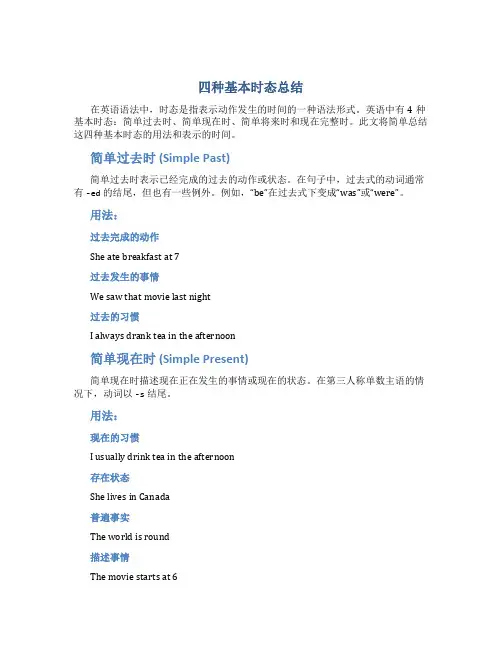
四种基本时态总结在英语语法中,时态是指表示动作发生的时间的一种语法形式。
英语中有4种基本时态:简单过去时、简单现在时、简单将来时和现在完整时。
此文将简单总结这四种基本时态的用法和表示的时间。
简单过去时 (Simple Past)简单过去时表示已经完成的过去的动作或状态。
在句子中,过去式的动词通常有-ed的结尾,但也有一些例外。
例如,“be”在过去式下变成“was”或“were”。
用法:过去完成的动作She ate breakfast at 7过去发生的事情We saw that movie last night过去的习惯I always drank tea in the afternoon简单现在时 (Simple Present)简单现在时描述现在正在发生的事情或现在的状态。
在第三人称单数主语的情况下,动词以-s结尾。
用法:现在的习惯I usually drink tea in the afternoon存在状态She lives in Canada普遍事实The world is round描述事情The movie starts at 6简单将来时 (Simple Future)简单将来时用于表示将来某个时间会发生的事情。
可以使用情态助动词will 和shall加上动词原形,也可以使用动词原形来表示未来。
用法:趋势I think gasoline prices will go up.决定或意愿I’ll help you with that homework after dinner在特定的时间或时间段内发生I’ll finish my homework by 9 PM现在完成时 (Present Perfect)现在完成时通常用于强调过去发生的事情与现在的联系。
它与简单过去时明显不同,因为它包括从过去开始,延续到现在或在过去一点时间内的动作或状态。
在句子中,现在完成时通常使用have或has和动词的过去分词。
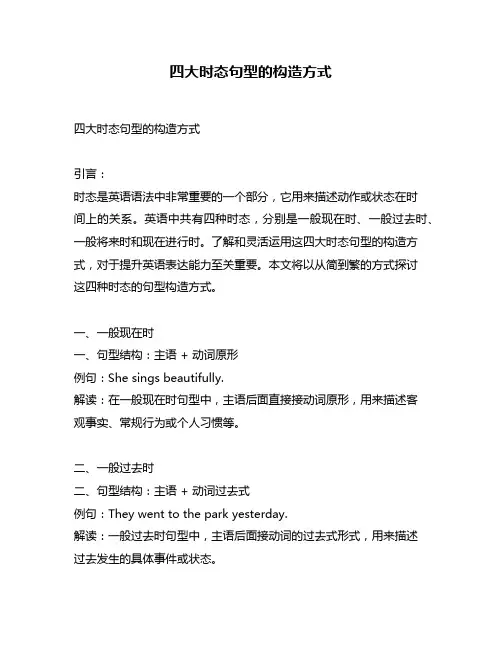
四大时态句型的构造方式四大时态句型的构造方式引言:时态是英语语法中非常重要的一个部分,它用来描述动作或状态在时间上的关系。
英语中共有四种时态,分别是一般现在时、一般过去时、一般将来时和现在进行时。
了解和灵活运用这四大时态句型的构造方式,对于提升英语表达能力至关重要。
本文将以从简到繁的方式探讨这四种时态的句型构造方式。
一、一般现在时一、句型结构:主语 + 动词原形例句:She sings beautifully.解读:在一般现在时句型中,主语后面直接接动词原形,用来描述客观事实、常规行为或个人习惯等。
二、一般过去时二、句型结构:主语 + 动词过去式例句:They went to the park yesterday.解读:一般过去时句型中,主语后面接动词的过去式形式,用来描述过去发生的具体事件或状态。
三、一般将来时三、句型结构:主语 + will + 动词原形例句:I will call you later.解读:一般将来时句型中,主语后面接will,然后再接动词的原形形式,用来表示将来发生的动作或事件。
四、现在进行时四、句型结构:主语 + am/is/are + 动词-ing形式例句:They are playing basketball now.解读:现在进行时句型中,主语后面接am/is/are,再接动词的-ing形式,用来描述当前正在进行的动作或状态。
总结和回顾:通过以上对四大时态句型的简要分析,我们可以发现它们在构造方式上有所不同,但都遵循基本的句型结构。
一般现在时主要用来描述客观事实和常规行为;一般过去时用来叙述过去的事件或状态;一般将来时可以表达将来的动作或事件;现在进行时则描述当前正在进行的动作或状态。
个人观点和理解:掌握四大时态句型的构造方式对于提高英语口语和写作能力非常重要。
了解每种时态的用法以及相应的句型结构,可以帮助我们准确表达自己的意思,并更好地理解他人的表达。
通过反复练习和实际运用,我们可以逐渐熟练地使用这些句型,从而提高英语表达的准确性和流利度。
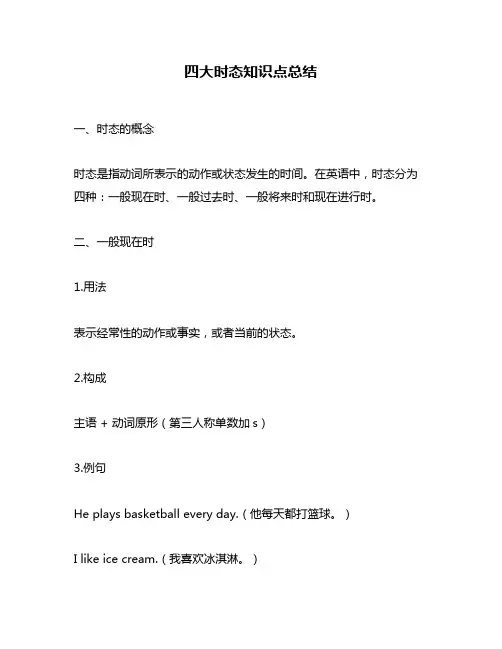
四大时态知识点总结一、时态的概念时态是指动词所表示的动作或状态发生的时间。
在英语中,时态分为四种:一般现在时、一般过去时、一般将来时和现在进行时。
二、一般现在时1.用法表示经常性的动作或事实,或者当前的状态。
2.构成主语 + 动词原形(第三人称单数加s)3.例句He plays basketball every day.(他每天都打篮球。
)I like ice cream.(我喜欢冰淇淋。
)三、一般过去时1.用法表示过去发生的动作或状态。
2.构成主语 + 动词过去式3.例句She went to the park yesterday.(她昨天去了公园。
)I studied English last night.(我昨晚学习了英语。
)四、一般将来时1.用法表示将来要发生的动作或状态。
2.构成主语 + will + 动词原形3.例句I will go to the beach tomorrow.(我明天会去海滩。
)She will study hard for the exam next week.(她下周会努力学习考试。
)五、现在进行时1.用法表示现在正在进行的动作。
2.构成主语 + am/is/are + 现在分词3.例句She is watching TV now.(她正在看电视。
)They are playing soccer in the park.(他们正在公园里踢足球。
)六、时态的转换1.一般现在时转一般过去时:动词加-ed或变成不规则动词过去式。
2.一般现在时转一般将来时:主语 + will + 动词原形。
3.一般过去时转现在完成时:have/has + 过去分词。
4.现在进行时转一般现在时:动作已经完成,改用一般现在时。
七、注意事项1.时间状语的使用,如now、yesterday、tomorrow等。
2.第三人称单数形式的变化,如he/she/it加s。
3.特殊情况下的变化,如be动词的变化和不规则动词的变化。
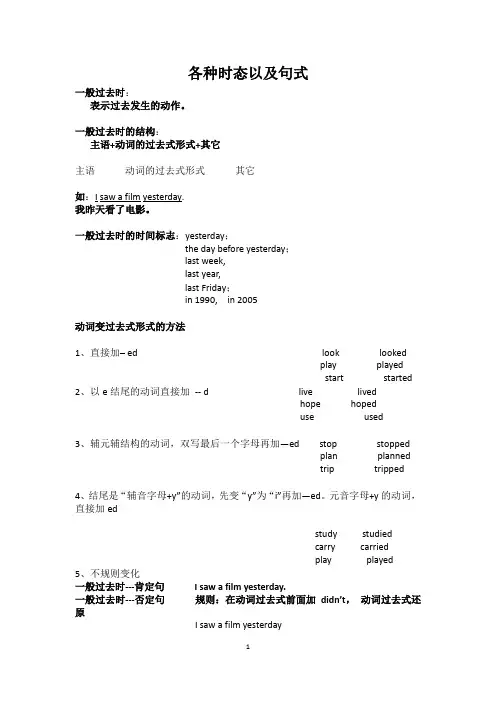
各种时态以及句式一般过去时:表示过去发生的动作。
一般过去时的结构:主语+动词的过去式形式+其它主语动词的过去式形式其它如:I saw a film yesterday.我昨天看了电影。
一般过去时的时间标志:yesterday;the day before yesterday;last week,last year,last Friday;in 1990, in 2005动词变过去式形式的方法1、直接加– ed look lookedplay playedstart started 2、以e结尾的动词直接加-- d live livedhope hopeduse used3、辅元辅结构的动词,双写最后一个字母再加—ed stop stoppedplan plannedtrip tripped 4、结尾是“辅音字母+y”的动词,先变“y”为“i”再加—ed。
元音字母+y的动词,直接加edstudy studiedcarry carriedplay played5、不规则变化一般过去时---肯定句I saw a film yesterday.一般过去时---否定句规则:在动词过去式前面加didn’t,动词过去式还原I saw a film yesterdayI didn’t see a film yesterday如果动词是be动词,则直接在be动词后面加notI was a student five years ago.I was not a student five years ago.一般现在时的句式:一般疑问句⑴句中有be动词或情态动词时,直接把be动词或情态动词提前即可,其他部分语序不变。
如:He was quiet. Was he quiet?He could sing English songs.Could he sing English songs?⑵句中有实意动词时,用助动词Did来引导,且实意动词改成原形。
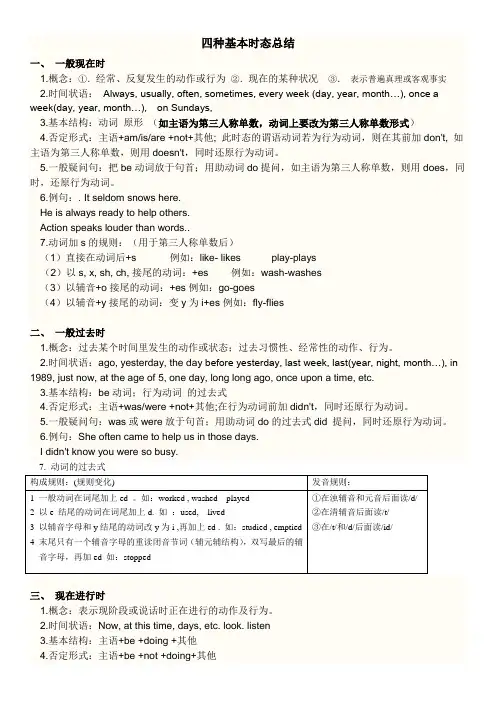
四种基本时态总结一、一般现在时1.概念:①.经常、反复发生的动作或行为②.现在的某种状况③.表示普遍真理或客观事实2.时间状语:Always, usually, often, sometimes, every week (day, year, month…), once a week(day, year, month…), on Sundays,3.基本结构:动词原形(如主语为第三人称单数,动词上要改为第三人称单数形式)4.否定形式:主语+am/is/are +not+其他; 此时态的谓语动词若为行为动词,则在其前加don't, 如主语为第三人称单数,则用doesn't,同时还原行为动词。
5.一般疑问句:把be动词放于句首;用助动词do提问,如主语为第三人称单数,则用does,同时,还原行为动词。
6.例句:. It seldom snows here.He is always ready to help others.Action speaks louder than words..7.动词加s的规则:(用于第三人称单数后)(1)直接在动词后+s 例如:like- likes play-plays(2)以s, x, sh, ch, 接尾的动词:+es 例如:wash-washes(3)以辅音+o接尾的动词:+es 例如:go-goes(4)以辅音+y接尾的动词:变y为i+es 例如:fly-flies二、一般过去时1.概念:过去某个时间里发生的动作或状态;过去习惯性、经常性的动作、行为。
2.时间状语:ago, yesterday, the da y before yesterday, last week, last(year, night, month…), in 1989, just now, at the age of 5, one day, long long ago, once upon a time, etc.3.基本结构:be动词;行为动词的过去式4.否定形式:主语+was/were +not+其他;在行为动词前加didn't,同时还原行为动词。
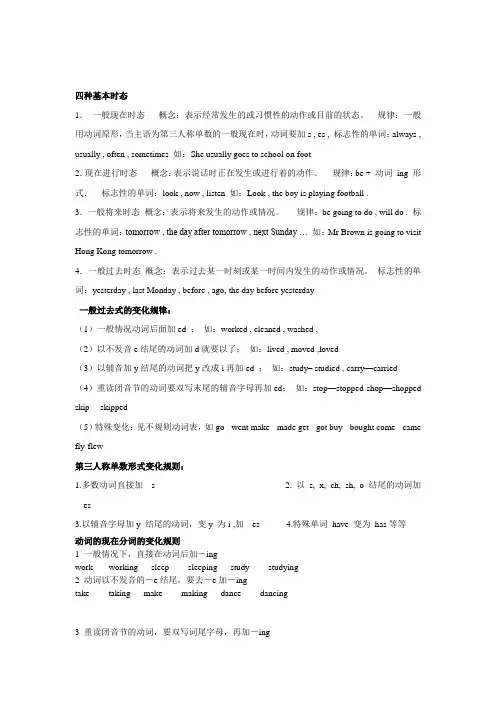
四种基本时态1.一般现在时态概念:表示经常发生的或习惯性的动作或目前的状态。
规律:一般用动词原形,当主语为第三人称单数的一般现在时,动词要加s , es , 标志性的单词:always , usually , often , sometimes 如:She usually goes to school on foot2.现在进行时态概念:表示说话时正在发生或进行着的动作。
规律:be + 动词ing 形式.标志性的单词:look , now , listen 如:Look , the boy is playing football .3.一般将来时态概念:表示将来发生的动作或情况。
规律:be going to do , will do . 标志性的单词:tomorrow , the day after tomorrow , next Sunday … 如:Mr Brown is going to visit Hong Kong tomorrow .4.一般过去时态概念:表示过去某一时刻或某一时间内发生的动作或情况。
标志性的单词:yesterday , last Monday , before , ago, the day before yesterday一般过去式的变化规律:(1)一般情况动词后面加ed ;如:worked , cleaned , washed ,(2)以不发音e结尾的动词加d就要以了;如:lived , moved ,loved(3)以辅音加y结尾的动词把y改成i再加ed ;如:study– studied , carry—carried (4)重读闭音节的动词要双写末尾的辅音字母再加ed;如:stop—stopped shop—shopped skip--- skipped(5)特殊变化:见不规则动词表,如go - went make - made get - got buy - bought come - came fly-flew第三人称单数形式变化规则:1.多数动词直接加---s2. 以s, x, ch, sh, o 结尾的动词加---es3.以辅音字母加y 结尾的动词,变y 为i ,加---es4.特殊单词have 变为has等等动词的现在分词的变化规则1 一般情况下,直接在动词后加-ingwork ---- working sleep ----- sleeping study ----- studying2 动词以不发音的-e结尾,要去-e加-ingtake ----- taking make ----- making dance ----- dancing3 重读闭音节的动词,要双写词尾字母,再加-ingcut ----- cutting put ----- putting begin ------ beginning4 以-ie结尾的动词,把变成y再加-inglie ----- lying tie ----- tying die ----- dying可数名词的复数变化规则:1.一般情况加s :book-- books mouth---mouths house---houses girl---girls2.以s 、sh 、ch 、x结尾的加es :class--- classes box----boxes match----matches3.辅音字母+ y结尾的变y为i加es:city---cities country----countries party----parties factory----factories4.以o 结尾的词+es的只有以下词:heroes Negroes tomatoes potatoeszeroes/zeros以o 结尾并且词尾有两个元音字母+s :radios, zoos, bamboos ,(pianos ,kilos photos) 5.以f,fe 结尾的变f或fe为v +es : thief wife life knife wolf half leaf shelf。
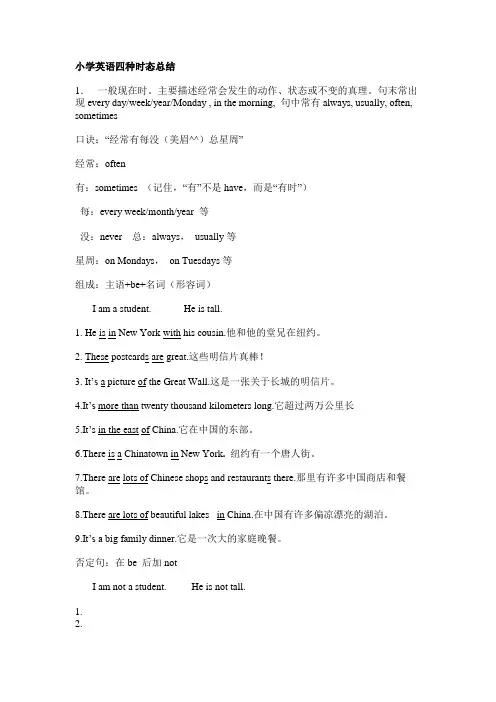
小学英语四种时态总结1.一般现在时。
主要描述经常会发生的动作、状态或不变的真理。
句末常出现every day/week/year/Monday , in the morning, 句中常有always, usually, often, sometimes口诀:“经常有每没(美眉^^)总星周”经常:often有:sometimes (记住,“有”不是have,而是“有时”)每:every week/month/year 等没:never 总:always,usually等星周:on Mondays,on Tuesdays等组成:主语+be+名词(形容词)I am a student. He is tall.1. He is in New York with his cousin.他和他的堂兄在纽约。
2. These postcards are great.这些明信片真棒!3. It’s a picture of the Great Wall.这是一张关于长城的明信片。
4.It’s more than twenty thousand kilometers long.它超过两万公里长5.It’s in the east of China.它在中国的东部。
6.There is a Chinatown in New York.纽约有一个唐人街。
7.There are lots of Chinese shops and restaurants there.那里有许多中国商店和餐馆。
8.There are lots of beautiful lakes in China.在中国有许多偏凉漂亮的湖泊。
9.It’s a big family dinner.它是一次大的家庭晚餐。
否定句:在be 后加notI am not a student. He is not tall.1.2.3.4.5.6.7.8.9.疑问句:be 动词提前到第一位。
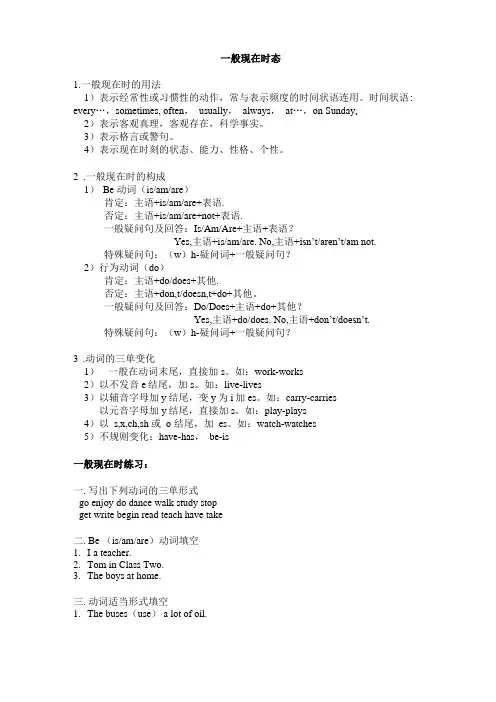
一般现在时态1.一般现在时的用法1)表示经常性或习惯性的动作,常与表示频度的时间状语连用。
时间状语: every…,sometimes, often,usually,always,at…,on Sunday o2)表示客观真理,客观存在,科学事实。
3)表示格言或警句。
4)表示现在时刻的状态、能力、性格、个性。
2.一般现在时的构成1)Be 动词(is/am/are)肯定:主语+is/am/are+表语.否定:主语+is/am/are+not+表语.一般疑问句及回答:Is/Am/Are+主语+表语?Yes,主语+is/am/are. No,主语+isn’t/aren’t/am not.特殊疑问句:(w)h-疑问词+一般疑问句?2)行为动词(do)肯定:主语+do/does+其他.否定:主语+don,t/doesn,t+do+其他。
一般疑问句及回答:Do/Does+主语+do+其他?Yes,主语+do/does. No,主语+don’t/doesn’t.特殊疑问句:(w)h-疑问词+一般疑问句?3.动词的三单变化1)一般在动词末尾,直接加s。
如:work-works2)以不发音e结尾,加s。
如:live-lives3)以辅音字母加y结尾,变y为i加es。
如:carry-carries以元音字母加y结尾,直接加s。
如:play-plays4)以s,x,ch,sh 或o 结尾,加es。
如:watch-watches5)不规则变化:have-has,be-is一般现在时练习:一.写出下列动词的三单形式go enjoy do dance walk study stopget write begin read teach have take二.Be (is/am/are)动词填空1.I a teacher.2.Tom in Class Two.3.The boys at home.三.动词适当形式填空1.The buses(use) a lot of oil.2.Each of us(have) strong points and weak points.3.My daughter(watch) TV every day. Sometimes she(see) a film on Sunday.4.Li Wei(have) a daughter. She(stay) in a nursery.(托儿所)5.Her mother(teach) English at a middle school.6.Jack often(listen) to the radio?7.They(play) football on Sundays.8.Daming often(go) to school on foot.9.We(not go) to school on Saturdays and Sundays.10.Tony(not have) piano lessons every day.四.句型转换1.They do morning exercises every day.否定句:一般疑问句:划线提问:2.Lucy does her homework in the evening.否定句:一般疑问句:划线提问:3.Her name is Li Mei.否定句:一般疑问句:划线提问:4.She has lunch at home every day.否定句:一般疑问句:划线提问:5.We have a meeting once a week.否定句:一般疑问句:划线提问:五.单项选择1.The Browns a nice car and Brown,s brother a nice jeepA. have/haveB. has/hasC. have/hasD. has/ have2.If their house not like ours, what it look like?A. is/isB. is/doesC. does/doesD. does/is3.--you think he will come? — If it tomorrow, he won,t come.A. Do/rainsB. Are/rainsC. Do/will rainD. Are/ will rain4.The little child not even know that the moon around the earth.A. do/moveB. do/movesC. does/movesD. did/moved一般过去时态1.一般过去时的用法1)表示在确定的过去时间里所发生的动作或存在的状态。
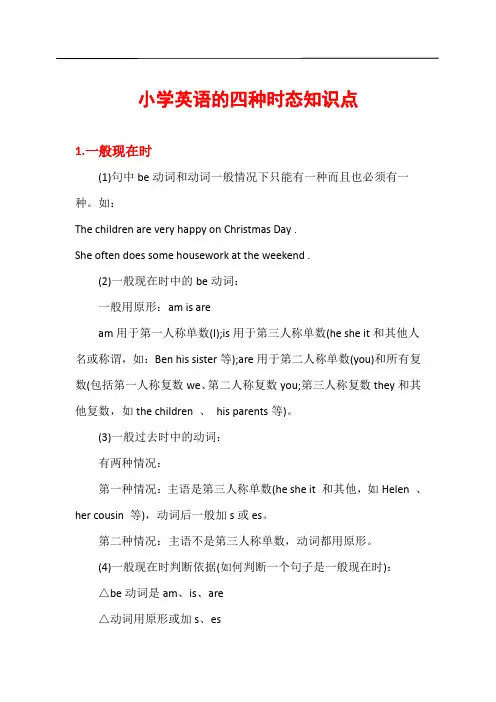
小学英语的四种时态知识点1.一般现在时(1)句中be动词和动词一般情况下只能有一种而且也必须有一种。
如:The children are very happy on Christmas Day .She often does some housework at the weekend .(2)一般现在时中的be动词:一般用原形:am is aream用于第一人称单数(I);is用于第三人称单数(he she it和其他人名或称谓,如:Ben his sister等);are用于第二人称单数(you)和所有复数(包括第一人称复数we、第二人称复数you;第三人称复数they和其他复数,如the children 、his parents等)。
(3)一般过去时中的动词:有两种情况:第一种情况:主语是第三人称单数(he she it 和其他,如Helen 、her cousin 等),动词后一般加s或es。
第二种情况:主语不是第三人称单数,动词都用原形。
(4)一般现在时判断依据(如何判断一个句子是一般现在时):△be动词是am、is、are△动词用原形或加s、es△没有时间状语或有usually、often、everyday、sometimes等不是具体的时间(5)有用的的依据:Be动词是is、am ←→名词用原形(这里包括可数名词的单数和不可数名词)Be动词是are ←→名词加s或es动词加s或es ←→主语是第三人称单数动词用原形←→主语不是第三人称单数(6)情态动词:我们现在学过的情态动词有:can、must、should、would。
情态动词后动词总是用原形。
(不受其他任何条件影响)2.一般过去时(1)句中be动词和动词一般情况下只能有一种而且也必须有一种。
如:The girls were on the grass just now .They visited my parents last weekend .(2)一般过去时中的be动词:一般用过去式:was werewas用于第一人称单数(I)和第三人称单数(he she it和其他人名或称谓,如:Ben 、his sister等);were用于第二人称单数(you)和所有复数(包括第一人称复数we、第二人称复数you;第三人称复数they 和其他复数,如the children 、his parents等)。
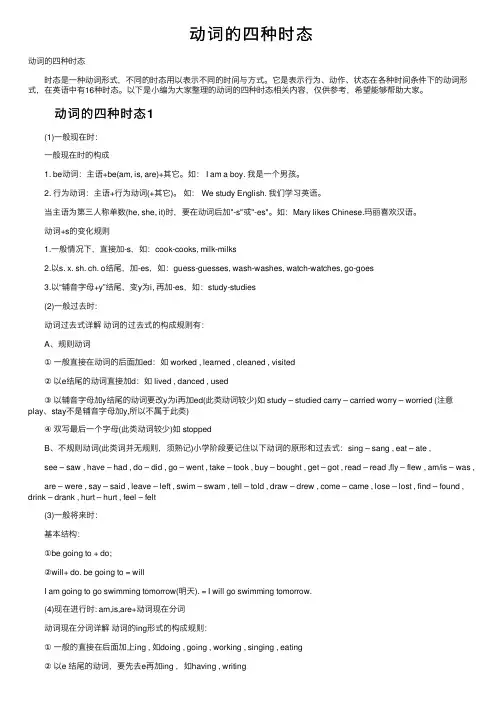
动词的四种时态动词的四种时态 时态是⼀种动词形式,不同的时态⽤以表⽰不同的时间与⽅式。
它是表⽰⾏为、动作、状态在各种时间条件下的动词形式,在英语中有16种时态。
以下是⼩编为⼤家整理的动词的四种时态相关内容,仅供参考,希望能够帮助⼤家。
动词的四种时态1 (1)⼀般现在时: ⼀般现在时的构成 1. be动词:主语+be(am, is, are)+其它。
如: I am a boy. 我是⼀个男孩。
2. ⾏为动词:主语+⾏为动词(+其它)。
如: We study English. 我们学习英语。
当主语为第三⼈称单数(he, she, it)时,要在动词后加"-s"或"-es"。
如:Mary likes Chinese.玛丽喜欢汉语。
动词+s的变化规则 1.⼀般情况下,直接加-s,如:cook-cooks, milk-milks 2.以s. x. sh. ch. o结尾,加-es,如:guess-guesses, wash-washes, watch-watches, go-goes 3.以“辅⾳字母+y”结尾,变y为i, 再加-es,如:study-studies (2)⼀般过去时: 动词过去式详解动词的过去式的构成规则有: A、规则动词 ①⼀般直接在动词的后⾯加ed:如 worked , learned , cleaned , visited ②以e结尾的动词直接加d:如 lived , danced , used ③以辅⾳字母加y结尾的动词要改y为i再加ed(此类动词较少)如 study – studied carry – carried worry – worried (注意play、stay不是辅⾳字母加y,所以不属于此类) ④双写最后⼀个字母(此类动词较少)如 stopped B、不规则动词(此类词并⽆规则,须熟记)⼩学阶段要记住以下动词的原形和过去式:sing – sang , eat – ate , see – saw , have – had , do – did , go – went , take – took , buy – bought , get – got , read – read ,fly – flew , am/is – was , are – were , say – said , leave – left , swim – swam , tell – told , draw – drew , come – came , lose – lost , find – found , drink – drank , hurt – hurt , feel – felt (3)⼀般将来时: 基本结构: ①be going to + do; ②will+ do. be going to = will I am going to go swimming tomorrow(明天). = I will go swimming tomorrow. (4)现在进⾏时: am,is,are+动词现在分词 动词现在分词详解动词的ing形式的构成规则: ①⼀般的直接在后⾯加上ing , 如doing , going , working , singing , eating ②以e 结尾的动词,要先去e再加ing ,如having , writing ③双写最后⼀个字母的(此类动词极少)有:running , swimming , sitting , getting 动词的四种时态2 ⼀般现在时 主要⽤来表⽰⼈、事物的现在状况和特点;表⽰经常或习惯性的动作,句⼦中常有often, always, from time to time 等时间状语;表⽰客观规律和永恒真理等。
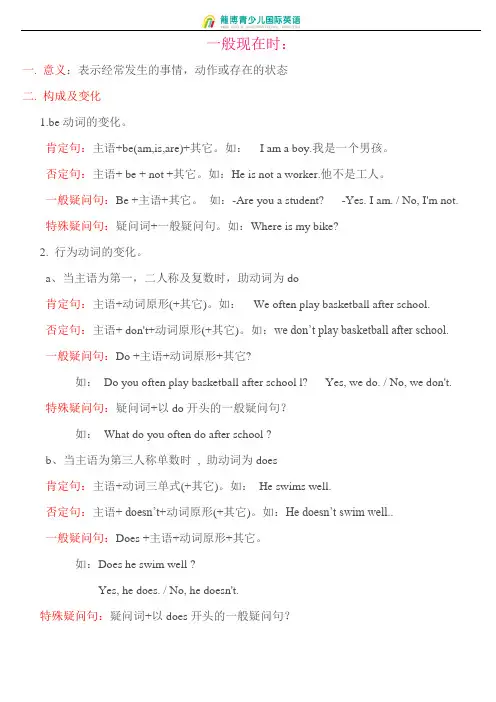
一般现在时:一. 意义:表示经常发生的事情,动作或存在的状态二. 构成及变化1.be动词的变化。
肯定句:主语+be(am,is,are)+其它。
如:I am a boy.我是一个男孩。
否定句:主语+ be + not +其它。
如:He is not a worker.他不是工人。
一般疑问句:Be +主语+其它。
如:-Are you a student? -Yes. I am. / No, I'm not.特殊疑问句:疑问词+一般疑问句。
如:Where is my bike?2. 行为动词的变化。
a、当主语为第一,二人称及复数时,助动词为do肯定句:主语+动词原形(+其它)。
如:We often play basketball after school.否定句:主语+ don't+动词原形(+其它)。
如:we don’t play basketball after school.一般疑问句:Do +主语+动词原形+其它?如:Do you often play basketball after school l? Yes, we do. / No, we don't.特殊疑问句:疑问词+以do开头的一般疑问句?如:What do you often do after school ?b、当主语为第三人称单数时, 助动词为does肯定句:主语+动词三单式(+其它)。
如:He swims well.否定句:主语+ doesn’t+动词原形(+其它)。
如:He doesn’t swim well..一般疑问句:Does +主语+动词原形+其它。
如:Does he swim well ?Yes, he does. / No, he doesn't.特殊疑问句:疑问词+以does开头的一般疑问句?如:How does your father go to work?三.第三人称单数的动词变化规则(只有在第三人称为主语的肯定句中,动词才用三单式)(1)多数动词直接加s:runs gets likes collets takes plays climbs…….(2)结尾是s, x, sh, ch, o,前为辅音字母,结尾加es :watches teaches goes does washes crosses mixes brushes(3)动词末尾y前为辅音:将y改为i加es: study→studies fly→flies carry→carriescry→cries但在y前如果为元音则直接加s:buys says四.时间标志:always , usually , often , sometimes ,ev ery…一般过去时:一、意义:表示过去某个时间发生的动作或存在的状态,常和表示过去的时间状语连用。
时态的变化规则时态是语法中一个重要的概念,它用来表示动作或状态发生的时间。
在英语中,时态的变化规则较为复杂,但掌握了它们,将能更好地表达自己的意思。
本文将介绍几种常见的时态,以及它们的变化规则。
1. 一般现在时一般现在时用来表示经常性的动作、客观事实或普遍真理。
其基本形式是主语 + 动词原形。
在第三人称单数形式中,需加上 -s 或 -es。
例如:- Tom plays basketball every Sunday.- The sun rises in the east.- Cats like fish.2. 一般过去时一般过去时用来表示过去发生的动作或状态。
其基本形式是主语 +动词过去式。
例如:- I walked to school yesterday.- They visited their grandparents last summer.- She studied English for three hours yesterday.3. 一般将来时一般将来时用来表示将来某个时间会发生的动作或状态。
其基本形式是主语 + will/shall + 动词原形。
例如:- We will go to the park tomorrow.- She shall finish her homework tonight.- They will arrive at the airport next week.4. 现在进行时现在进行时用来表示现在正在进行的动作。
其基本形式是主语 + am/is/are + 动词 -ing 形式。
例如:- They are studying for the exam.- He is watching TV at the moment.- We are having dinner now.5. 过去进行时过去进行时用来表示过去某个时间正在进行的动作。
其基本形式是主语 + was/were + 动词 -ing 形式。
小学英语四种时态知识点加练习一、一般现在时一. 意义:表示经常发生的事情;动作或存在的状态二. 构成及变化1.be动词的变化..肯定句:主语+beam;is;are+其它..如:I am a boy.我是一个男孩..否定句:主语+ be + not +其它..如:He is not a worker.他不是工人..一般疑问句:Be +主语+其它.. 如:-Are you a student -Yes. I am. / No; I'm not. 特殊疑问句:疑问词+一般疑问句..如:Where is my bike2. 行为动词的变化..l、当主语为第一;二人称及复数时;助动词为do肯定句:主语+动词原形+其它..如:We often play basketball after school.否定句:主语+ don't+动词原形+其它..如:we don’t play basketball after school.一般疑问句:Do +主语+动词原形+其它如: Do you often play basketball after school Yes; we do. / No; we don't.特殊疑问句:疑问词+以do开头的一般疑问句如: What do you often do after school2、当主语为第三人称单数时 ;助动词为does肯定句:主语+动词三单式+其它..如: He swims well.否定句:主语+ doesn’t+动词原形+其它..如:He doesn’t swim well..一般疑问句:Does +主语+动词原形+其它..如:Does he swim wellYes; he does. / No; he doesn't.特殊疑问句:疑问词+以does开头的一般疑问句如: How does your father go to work三.第三人称单数的动词变化规则只有在第三人称为主语的肯定句中;动词才用三单式1多数动词直接加s: runs gets likes collets takes plays climbs…….2结尾是s; x; sh; ch; o;前为辅音字母; 结尾加es : watches teaches goes does washes crosses mixes brushes3动词末尾y前为辅音:将y改为i加es: study→studies fly→flies carry→carries cry→cries但在y前如果为元音则直接加s: buys says四.时间标志:always ; usually ; often ; sometimes ;every…一般现在时练习题I.用下列单词的适当形式填空1.We often___________play in the playground.2.He _________get up at si x o’clock.3.__________you _________brush your teeth every morning4.What________________do he usually________________do after school5.Danny ________________study English; Chinese; maths; science and Art at school.6.Mike sometimes __________go to the park with his sister.7.At eight at night; she __________watch TV with his parents.8.________ Mike________read English every day9.How many lessons_________your classmates________have on Monday10.What time_________his mother_________do the houseworkII.改句子1.Do you often play football after school 改为肯定句2.I have many books.改为否定句3.Gao Shan’s sister likes playing table tennis 改为否定句4.She lives in a small town near New York.改为一般疑问句5.I watch TV every day.改为一般疑问句6.We have four lessons.改为否定句7.Nancy doe sn’t run fast 改为肯定句二、现在进行时一、概念现在进行时表示说话时正在进行或发生的动作;也可表示当前一段时间内的活动或现阶段正在进行的动作..结构:be动词 am / is / are + doing二、现在分词的构成:1.大多数动词后可在动词后直接加-ing.Eg: carry-carrying;catch-catching;drink-drinking; enjoy-enjoying hurry-hurrying ;do-doing ; read-reading ; think-thinking2. 如果动词以-e结尾;则去掉-e;再加-ing;如come-coming ; have-having ; make-making;ride-riding;write-writing;take-taking;use-using.3. 如果动词只有一个元音字母;而其后跟有一个辅音字母时;将此辅音字母双写;再加-ing 如:hit-hitting;let-letting; put-putting;run-running;sit-sitting.4. 如果动词有两个音节;且重音在第二个音节上;则末尾的辅音字母须双写;再加-ing; 如: forget-forgetting;prefer-preferring;upset-upsetting.试比较benefit/benfiting;differ/differing;profit/profiting;这些词的重音在第一个音节上;因此其末尾的辅音字母不双写.5. 以-ic 结尾的动词;应先把-ic 变为-ick;再加-ing;eg: panic/panicking;picnic/picnicking;但 lie/lying ;die/dying;tie/tying是特殊变化要记住.三、句型结构:1.现在进行时的肯定形式、否定形式、疑问形式及其回答;所有变化都体现在助动词 be is / am / are 上.1现在进行时的肯定形式:主语+beam/ is/are+doing+其他成分I am singing . They are writing .2现在进行时的否定形式:主语+beam/ is/are+not +doing+其他成分I am not singing . They aren’t writing .3一般疑问句及回答:beam/ is/are+ 主语+doing+其他成分Am I singing Yes ;you are . / No ;you aren’t .Are they writing Yes ;they are . / No ;they aren’t .4特殊疑问句及回答:特殊疑问词+beam/ is/are+主语+doing+其他成分What are you doing We are playing 要求就提问内容具体回答.2. 缩写形式如下:I am---I’m You are---You’re He is---He’s She is---She’sIt is---It’s We are---We’re They are---They’re3.说明: 不是所有动词都能用现在进行时态的;如:see、like、want、know 等动词往往都不用进行时态.四.用法:1.表示现在指说话人说话时正在发生的事情.往往与 now;at the moment;at present;just now;listenlook等副词连用;以示强调.We are waiting for you. What are you doing Some one’s knocking at the door.2.正在进行着的动作可视为未完成的动作:He’s talking to his friends in the classroom.可用still 一词强调动作的持续性He’s still talking to his friends in the classroom.3. 表示长期的或重复性的动作;说话时动作未必正在进行.Mr. Black is writing another article.Don’t take that book away. Your father’s using it.She is learning piano under Mr. Black.4.现在进行时可用来表示不会长期发生的动作或情况;或被认为在短期内正在进行的动作或存在的情况:What’s your brother doing these days He’s studying English at Oxford University.5.现在进行时也可以用来表示当前的动向:People are becoming more and more beautiful these days.6. 表示渐变的动词有:become;turn;get;grow;run;go;begin等.The leaves are turning brown.It’s getting colder and colder.7.与always;constantly;forever 等词连用;表示反复发生的动作或持续存在的状态;往往带有说话人的主观色彩.You are always changing your mind.8. 现在进行时表将来现在进行时以及 be going to可以表示为将来安排好的活动和事件We’re spending next winter in China. 用arrive;come;go;leave 等动词的现在进行时描写行程安排;也通常有“将到达”和“将离去”的意思:He’s arriving tomorrow morning.9.当现在进行时表示某事发生的次数过多时;则有时含有抱怨;讨厌;赞扬等的意思:He is al ways singing at night;and we can’t fall asleep late at night.现在进行时练习题一.用现在进行时完成下列句子:1. ______you__________fly a kite Yes;_______.2. ______you___________sit in the boat3. ______he_____________talk with me4. We_______________play football now.5. What_________you__________do6. I_____________sing an English song.7. What________he____________mend8. He______________mend a car.9. These boys _________ play tennis on the playground.10. My mother______________ cook in the kitchen.11. We can’t help you;because we ____________ have classes.12. ________ the boy ___________ write his homework13. Look These butterflies _________ fly in the sky.14. Listen The girl ___________ sing in the next room.15. The naughty boy __________ swim in the river.二.选择1. Look. Lucy is_____ a new bike today.A. jumpingB. runningC. riding D takeing2. The children _____ football.A. is playingB. are playingC. play theD. play a3. They ______TV in the evening. They do their homework.A. are watchingB. can’t watchingC. don’t watchD. don’t watching4. Listen She____ in the classroom.A. is singingB. sing C .to sing D. is sing5. ______are you eating I’m eating ______ meat.A. What;someB. Which;anyC. Where;notD. What;a6. Is she ____ somethingA. eatB. eatingC. eattingD. eats7.My dictionary ___;I have looked for it everywhere but still___ it.A. has lost;don’t findB. is missing;don’t findC. has lost;haven’t foundD. ismissing;haven’t found.8..Having a computer for personal use is no easy task because technology _______ sorapidly.A. is changingB. has changedC. will have changedD. will change9. The building_______ ;I can’t stand the noise.A. was being builtB. is builtC. is being builtD. builds10. I can’t catch up with the fashion;b ecause the clothes style_______ all the time.A. has changedB. is changedC. is changingD. changed一般将来时一、概念:表示将要发生的动作或存在的状态及打算、计划或准备做某事..句中一般有以下时间状语:tomorrow; next dayweek; month; year…;soon; the day after tomorrow后天等..二、基本结构:①be going to + do;②will+ do.三、否定句:在be动词am; is; are后加not或情态动词will后加not成won’t..例如:I’m going to have a picnic this afternoon.→ I’m not going to have a picnic this afternoon.四、一般疑问句: be或will提到句首;some改为any; and改为or;第一二人称互换..例如:We are going to go on an outing this weekend. → Are you going to go on an outing this weekend五、对划线部分提问..一般情况;一般将来时的对划线部分有三种情况..1. 问人..Who 例如:I’m going to New York soon. →Who’s going to New York soon.2. 问干什么..What … do.例如: My father is going to watch a race with me this afternoon. →What is your father going to do with you this afternoon.3. 问什么时候..When.例如:She’s going to go to bed at nine. →When is she going to bed六、同义句:be going to = willI am going to go swimming tomorrow明天. = I will go swimming tomorrow.一般将来时练习题1. 我打算明天和朋友去野炊..I_____ _______ _________ have a picnic with my friends.I ________ have a picnic with my friends.2. 下个星期一你打算去干嘛我想去打篮球..What ________ ________ _________ _________ _________ next Monday I _______ ______ _____ play basketball.What _________ you do next Monday I ________ play basketball.3. 你妈妈这个周末去购物吗是;她要去买一些水果.._____ your mother _______ ________ go shopping this ___________Yes; she _________. She ______ ________ __________ buy some fruit.4. 你们打算什么时候见面..What time _______ you _________ __________ meet改句子..5. Nancy is going to go camping.改否定Nancy ________ going to go camping.6. I’ll go and join them.改否定I _______ go ______ join them.7. I’m going to get up at 6:30 tomorrow.改一般疑问句________ _______ ________ to get up at 6:30 tomorrow8. We will meet at the bus stop at 10:30.改一般疑问句_______ ________ meet at the bus stop at 10:30.9. She is going to listen to music after school.对划线部分提问________ _______ she ________ ________ _________ after school10. My father and mother are going to see a play the day after tomorrow.同上_________ _________ going to see a play the day after tomorrow.用所给词的适当形式填空..11. Today is a sunny day. We ___________________ have a picnic this afternoon.12. My brother _______________ go to Shanghai next week.13. Tom often ______________go to school on foot. But today is rain. He ______________ go to school by bike.14. What do you usually do at weekends I usually __________ watch TV and ____________catch insects.15. It’s Friday today. What _____she _________ do this weekend She ______________ watch TV and _____________ catch insects.一般过去时I. 一般过去时的概念一般过去时表示过去某个时间发生的动作或存在的状态..常和表示过去的时间状语连用..如:last year/week/night/month; yesterday等..例如:①I saw him in the street yesterday. 昨天我在街上看见他了..②Li Mei always went to school on foot last year. 去年李梅总是步行上学..II. 一般过去时的构成动词过去式的构成:1规则动词过去式的构成有四条规则:①一般在动词原形末尾直接加上-ed..如:look-looked..②以不发音的字母e结尾的动词;去e再加-ed..如:live-lived..③末尾只有一个辅音字母的重读闭音节;先双写这个辅音字母;再加-ed..如:stop-stopped..④末尾是辅音字母+y结尾的动词;先变y为i;然后再加-ed..如:study-studied..2不规则动词的过去式需特殊记忆..amis-was; are-were; go-went; come-came; take-took; have has-hadread-read; make-made; see-saw; go-went; eat-ate;III. 一般过去时的几种句型肯定句结构为:主语+动词的过去式+其它..如:He went to the toy store yesterday. 他昨天去玩具店了..否定句结构为:主语+did not didn't+动词原形+其它..如:He didn't go to the toy store yesterday. 他昨天没去玩具店..一般疑问句的构成:Did+主语+动词原形+其它如:1 -Did you go to Beijing last week -Yes; we did. No; we didn't.2 -Did you meet the businessman before -No; I didn't. Yes; I did.特殊疑问句的构成:疑问词+did+主语+动词原形+其它如:1 -What did you do last night -I did my homework.2 -Where did you go last week -I went to Shanghai with my parents.小学阶段要掌握的几个动词的过去式:watched TV; washed clothes; played football; cleaned the room;visited grandparents; went to a park; went swimming; read a book; went fishing; went hiking; learned Chinese; sang and danced; took pictures; climbed a mountain; ate good food; bought presents; roweda boat; saw elephants; went skiing; went ice-skating.一般过去时练习题I.用所给的动词的适当形式填空..⒈He __visited____visit the Great Wall last year.2.We____had___have a good time yesterday.3.We often ____went__go to school by bus last year.4.I __lived__livein the village when I was a child.5.Mike__saw__see a big tiger in the nature park last year.6.Sam____did___ do the housework yesterday.7.___Did_do you ___enjoy__enjoy yourself yesterday8.-__Did__doyou ___play__play the violin in the afternoon yesterday-No; I didn't. I___drew___drawsome pictures there.9.. I ___ate___ eat a big pizza yesterday.10.There__were_____ be many sheep on the farm last year.II.选择填空1. She watered the flowers ________.A tomorrowB sometimesC yesterday morning2.What ____ Mike do last weekendA doB doesC did3. I ___ my room last Sunday.A cleanedB cleanC am cleaning4. I often help my mother _____ housework.A doesB didC do5. _____ you _____ TV last night .A Do; watchB Did; watchC Did; watched6.---Did your father write an e-mail yesterdayA Yes; he did.B Yes; he doesC No; he don’t7.They _____ on a trip in February ;2007.A are goingB goingC went8.We’re going to _____ mountains tomorrow .A climbB climbedC climbingIII.根据句意;填上合适的单词..1.-Where you go on your holiday - I a park. 2.- did you do on your holiday - I presents.3.- did you go there I I went plane.4.- What did you learned ;learn last Monday5.- Did you a boat yesterday课后练习一、写出下列动词的第三人称单数drink ________ go _______ stay ________ make ________look _________ have_______ pass_______ carry ____come________ watch______ plant_______ fly ________study_______ brush________ do_________ teach_______二、写出下列动词的现在分词play________ run__________ swim _________make__________go_________ like________ write________ ski___________ read________ have_________ sing________ dance_________put_________ see________ buy _________ love____________live_______ take_________ come ________ get_________stop_________ sit ________ begin________ shop___________三、写出下列动词的过去式is\am_________ fly_______ plant________ are ________drink_________ play_______ go________ make ________does_________ dance________ worry________ ask _____taste_________ eat__________ draw________ put ______throw________ kick_________ pass_______ do ________四、用行为动词的适当形式填空1. He _________ live in Wuxi two years ago.2. The cat ________ eat a bird last night.3. We _______ have a party last Halloween.4. Nancy ________ pick up oranges on the farm last week.5. I ________ make a model ship with Mike yesterday.6. They ________ play chess in the classroom last PE lesson.7. My mother _______ cook a nice food last Spring Festival.8. The girls ________ sing and _______ dance at the party.9. She and I ________take a walk together every evening.10. There ________be some water in the bottle.11. Today is a sunny day. We ___________________ have a picnic this afternoon.12. My brother _______________ go to Shanghai next week.13. Tom often ___________go to school on foot. But today is rain. He ___________ go to school by bike.14. What do you usually do at weekends I usually __________ watch TV and ____________catch insects15. It’s Friday today. What _____she _________ do this weekend She ______________ watch TV and _____________ catch insects.16. She _______go to school from Monday to Friday.17. Liu Tao _______do not like PE.18. The child often _______watch TV in the evening.19. Su Hai and Su Yang _______have eight lessons this term.20. -What day _______be it today-It’s Saturday.21.The boy __________________ drawa picture now.22. Listen .Some girls _______________ singin the classroom .23. My mother _________________ cook some nice food now.24. What _____ you ______ do now25. Look . They _______________ have an English lesson .26.They ____________not ;water the flowers now.27.Look the girls ________________dance in the classroom .28.What is our granddaughter doing She _________listen to music.29. It’s 5 o’clock now. We _____________havesupper now30.______Helen____________wash clothes Yes ;she is .31. It _____ be the 2nd of November yesterday. Mr White ________ go to his office by car.32. Gao Shan ________ put the book on his head a moment ago.33. Don’t ______ the house. Mum _______ it yesterday. clean34. What ____ you ______ just now I _______ some housework. do35. They _________ make a kite a week ago.36. I want to ______ apples. But my dad _______ all of them last month. pick37. _______ he ______ the flowers this morning Yes; he _____. water38. She ____ be a pretty girl. Look; she _____ do Chinese dances.39. The students often _________ draw some pictures in the art room.40.What ______ Mike do on the farm He ________ cows. milk五、用be动词的适当形式填空1. I ______ watch a cartoon on Saturday.2. Her father _______ read a newspaper last night.3. We _________ to zoo yesterday; we _____ to the park. go4. ______ you _______ visit your relatives last Spring Festival5. ______ he _______ fly a kite on Sunday Yes; he ______.6. Gao Shan _______ pull up carrots last National Day holiday.7. I ____________ sweep the floor yesterday; but my mother ______.8. What ______ she _______ find in the garden last morning She __________ find a beautiful butterfly.六、句型转换1. Su Hai took some photos at the Sports day.否定句:________________________________________________一般疑问句:____________________________________________肯、否定回答:__________________________________________2. Nancy went to school early.否定句:________________________________________________一般疑问句:____________________________________________肯、否定回答:__________________________________________3.He is playing the football in the playground .对划线部分进行提问_________________________________________________________________4.Tom is reading books in his study . 对划线部分进行提问_________________________________________________________________5. It was exciting.否定句:________________________________________________一般疑问句:____________________________________________ 肯、否定回答:__________________________________________七、按照要求改写句子1. Daniel watches TV every evening.改为否定句___________________________________________________2. I do my homework every day.改为一般疑问句;作否定回答____________________________________________________________________________________3. She likes milk.改为一般疑问句;作肯定回答___________________________________________________________________________________4. Amy likes playing computer games.改为一般疑问句;作否定回答____________________________________________________________________________________________5. We go to school every morning.改为否定句_______________________________________________________6. He speaks English very well.改为否定句___________________________________________________7. I like taking photos in the park.对划线部分提问________________________________________________________ 8. John comes from Canada.对划线部分提问___________________________________________________9. She is always a good student.改为一般疑问句;作否定回答________________________________________________________________________________________10. Simon and Daniel like going skating.改为否定句___________________________________________________八、改错划出错误的地方;将正确的写在横线上1. Is your brother speak English __________________2. Does he likes going fishing __________________3. He likes play games after class. __________________4. Mr. Wu teachs us English. __________________5. She don’t do her homework on Sundays. _________________九、填空1. 我打算明天和朋友去野炊..I_____ _______ _________ have a picnic with my friends.I ________ have a picnic with my friends.2. 下个星期一你打算去干嘛我想去打篮球..What ________ ________ _________ _________ _________ next MondayI _______ ______ _____ play basketball./ What _________ you do next MondayI ________ play basketball.3. 你妈妈这个周末去购物吗是;她要去买一些水果.._____ your mother _______ ________ go shopping this ___________Yes; she _________. She ______ ________ __________ buy some fruit.4. 你们打算什么时候见面..What time _______ you _________ __________ meet。
四大时态用法一、一般现在时一般现在时表示经常性的、习惯性的、普遍的动作或状态。
它的构成是:主语+动词原形+其他。
例如:1. The sun rises in the east.(太阳从东方升起。
)2. I usually go to bed at 10 o'clock.(我通常十点钟上床睡觉。
)3. The cat likes to play with a ball of thread.(猫喜欢玩线球。
)二、一般过去时一般过去时表示过去某个时间发生的动作或状态。
它的构成是:主语+动词的过去式+其他。
例如:1. He studied English in college.(他在大学学习英语。
)2. We went to the beach last summer.(去年夏天我们去了海滩。
)3. She lived in Paris for three years.(她在巴黎住了三年。
)三、一般将来时一般将来时表示将来某个时间要发生的动作或状态。
它的构成是:主语+will+动词原形+其他。
例如:1. I will visit my grandparents next weekend.(下个周末我要去看望爷爷奶奶。
)2. They will have a party on Friday.(他们星期五要开个派对。
)3. She will become a doctor in the future.(她将来会成为一名医生。
)四、现在进行时现在进行时表示现在正在进行的动作。
它的构成是:主语+be(am/is/are)+动词的ing形式+其他。
例如:1. They are watching a movie at the cinema now.(他们现在正在电影院看电影。
)2. I am studying for the exam this week.(这周我在准备考试。
)3. She is cooking dinner in the kitchen.(她正在厨房做晚饭。
英语四种时态总结英语时态是描述动作或状态发生的时间的一种形式。
总体而言,英语有12种时态形式,其中包括四种基本时态:一般现在时、一般过去时、一般将来时和现在进行时。
下面将对这四种时态进行详细总结。
一、一般现在时(Simple Present Tense)一般现在时表示经常、习惯性或普遍真理的动作或状态。
一般现在时的结构为:主语 + 动词原形(例外:第三人称单数要加-s或-es)。
在肯定句中,主语和动词保持原样;在否定句中,加上do not或doesn't;在疑问句中,将do/does置于主语之前。
例句:- She sings well.(她唱得很好。
)- They don't like coffee.(他们不喜欢咖啡。
)- Does he play football?(他踢足球吗?)二、一般过去时(Simple Past Tense)一般过去时表示过去某个具体时间发生的动作或状态。
一般过去时的结构为:主语 + 动词过去式。
在肯定句中,直接使用动词的过去式;在否定句中,在动词前加上did not;在疑问句中,在主语前加上did。
例句:- He studied English yesterday.(他昨天学习了英语。
)- They didn't go to the party.(他们没有去参加派对。
)- Did you finish your homework?(你完成作业了吗?)三、一般将来时(Simple Future Tense)一般将来时表示将来会发生的动作或状态。
一般将来时的结构为:主语 + will/shall + 动词原形。
在肯定句中,使用will/shall加上动词原形;在否定句中,在will/shall之后加上not;在疑问句中,在主语之前使用will/shall。
例句:- I will go to the beach tomorrow.(我明天会去海滩。
)- She won't come to the party.(她不会来参加派对。